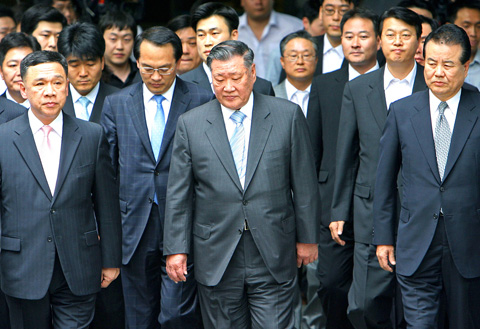The Hyundai Motor boss avoided going to jail yesterday when a South Korean court upheld his suspended prison sentence but it ordered him to undertake tougher community service involving physical labor.
Chung Mong-koo, who prosecutors had accused of raising a slush fund to bribe government officials, politicians and bankers in return for business favors, was given a suspended three-year jail sentence, an appeal court confirmed.
The court also ordered Chung to undertake 300 hours of public service involving manual work for charities or protection of the environment after an earlier order had been seen as too soft.

PHOTO: AFP
South Korean judges have a long record of imposing lenient punishments on chaebol — giant family-run conglomerates — bosses and other prominent white-collar criminals.
Chung, 69, was sentenced to three years in prison in February last year for breach of trust and embezzling 90 billion won (US$87.4 million) in company funds through fraudulent accounting.
An appeal court, however, quashed the prison term and replaced it with a three-year suspended sentence, saying his imprisonment would badly damage South Korea’s economy.
Chung had also been ordered to give lectures and write articles in the local media on business ethics — and to make good on his pledge to donate 840 billion won to charity.a
Prosecutors appealed, saying previous service orders involved physical labor.
In April, the Supreme Court ordered the lower court to reconsider its sentence saying lecturing or writing articles was not tantamount to labor as described in the criminal code.
“The defendant’s [crime] was extenuated by the fact that he had tried to address wrong practices and pledged to donate 840 billion won to society,” appeal court judge Kil Ki-bong said in his new ruling yesterday.
Hyundai Motor welcomed the court’s decision, which came two years after its boss was arrested. Chung remained free pending the new ruling.
“We are greatly relieved that this case is finally over. We can now focus all our energies on making the group a global leader,” it said in a statement.
The Hyundai group, including affiliate Kia Motors, controls 70 percent of the country’s auto market and accounts for 5.4 percent of GDP.
Chung, who had admitted the existence of the slush fund but said he was not directly involved in embezzlement, is aiming to make it the world’s No. 5 carmaker, from No. 6 currently.
His lawyers said the fund was spent helping improve the productivity and morale of employees and expanding sales networks, as well as for making donations to politicians.

MORE VISITORS: The Tourism Administration said that it is seeing positive prospects in its efforts to expand the tourism market in North America and Europe Taiwan has been ranked as the cheapest place in the world to travel to this year, based on a list recommended by NerdWallet. The San Francisco-based personal finance company said that Taiwan topped the list of 16 nations it chose for budget travelers because US tourists do not need visas and travelers can easily have a good meal for less than US$10. A bus ride in Taipei costs just under US$0.50, while subway rides start at US$0.60, the firm said, adding that public transportation in Taiwan is easy to navigate. The firm also called Taiwan a “food lover’s paradise,” citing inexpensive breakfast stalls

TRADE: A mandatory declaration of origin for manufactured goods bound for the US is to take effect on May 7 to block China from exploiting Taiwan’s trade channels All products manufactured in Taiwan and exported to the US must include a signed declaration of origin starting on May 7, the Bureau of Foreign Trade announced yesterday. US President Donald Trump on April 2 imposed a 32 percent tariff on imports from Taiwan, but one week later announced a 90-day pause on its implementation. However, a universal 10 percent tariff was immediately applied to most imports from around the world. On April 12, the Trump administration further exempted computers, smartphones and semiconductors from the new tariffs. In response, President William Lai’s (賴清德) administration has introduced a series of countermeasures to support affected

CROSS-STRAIT: The vast majority of Taiwanese support maintaining the ‘status quo,’ while concern is rising about Beijing’s influence operations More than eight out of 10 Taiwanese reject Beijing’s “one country, two systems” framework for cross-strait relations, according to a survey released by the Mainland Affairs Council (MAC) on Thursday. The MAC’s latest quarterly survey found that 84.4 percent of respondents opposed Beijing’s “one country, two systems” formula for handling cross-strait relations — a figure consistent with past polling. Over the past three years, opposition to the framework has remained high, ranging from a low of 83.6 percent in April 2023 to a peak of 89.6 percent in April last year. In the most recent poll, 82.5 percent also rejected China’s

PLUGGING HOLES: The amendments would bring the legislation in line with systems found in other countries such as Japan and the US, Legislator Chen Kuan-ting said Democratic Progressive Party (DPP) Legislator Chen Kuan-ting (陳冠廷) has proposed amending national security legislation amid a spate of espionage cases. Potential gaps in security vetting procedures for personnel with access to sensitive information prompted him to propose the amendments, which would introduce changes to Article 14 of the Classified National Security Information Protection Act (國家機密保護法), Chen said yesterday. The proposal, which aims to enhance interagency vetting procedures and reduce the risk of classified information leaks, would establish a comprehensive security clearance system in Taiwan, he said. The amendment would require character and loyalty checks for civil servants and intelligence personnel prior to